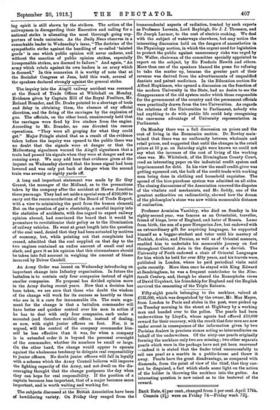The subjects discussed at the British Association have been of
bewildering variety. On Friday they ranged from the
transcendental aspects of radiation, treated by such experts as Professor Lorentz, Lord Rayleigh, Sir J. J. Thomson, and Sir Joseph Larmor, to the cost of electric cooking. We deal with the subject of waterways elsewhere, but may notice the interesting discussion held on the dangers of anaesthetics in the Physiology section, in which the urgent need for legislation to protect the public against unnecessary risks was urged by Dr. Waller, chairman of the committee specially appointed to report on the subject, by Sir Frederic Hewitt and others. More than one of the speakers blamed the press for refusing to take the matter up, because the greater part of their revenue was derived from the advertisements of unqualified dentists and patent medicines. In the Education section Sir Alfred Hopkinson, who opened a discussion on the function of the modern University in the State, had no desire to see the disappearance of the old system under which those responsible for the government of the country and the permanent officials were practically drawn from the two Universities. As regards the relations of the Universities to Parliament, nobody who had anything to do with public life could help recognizing the enormous advantage of University representation in Parliament.










































 Previous page
Previous page